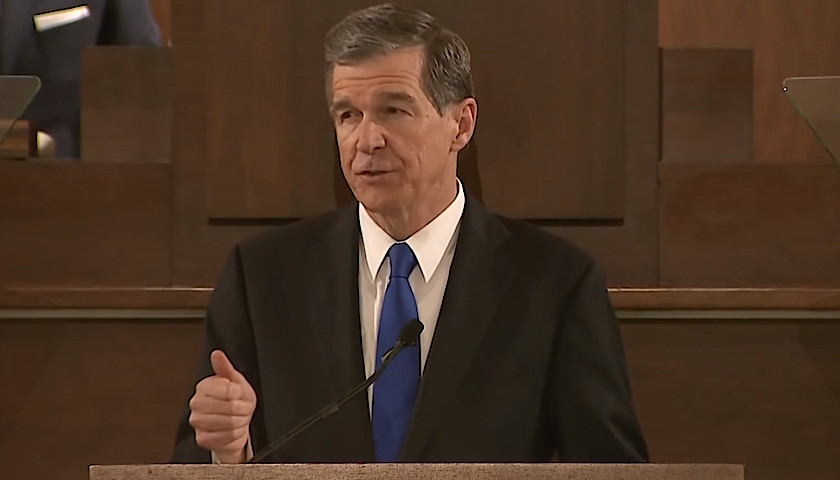More state spending, an education bond, climate change, and the expansion of Medicaid are some of the highlights from North Carolina Democratic Gov. Roy Cooper’s annual State of the State address.
Gov. Cooper’s speech, which was broadcast on the his Facebook page, started by discussing the devastation Hurricane Florence caused the state and how “resilient” North Carolinians are.
“First, we must be determined to help our state recover stronger and smarter than ever,” said Cooper. He went on to say that his administration is “determined to help North Carolinians recover, and we’re making progress.”
But the governor’s words on storm recovery ring a bit hollow. While Cooper did talk at length about Hurricane Florence, once again Hurricane Matthew victims seem to be forgotten.
The failings of the Cooper administration’s Hurricane Matthew efforts have even caught the attention of The New York Times, who noted that North Carolina was a “slow spender” when it came to the federal funds allotted for Matthew’s victims. As recently as last month, more problems arose with a recovery effort contract.
Cooper’s speech segued from Hurricane Florence into climate change.
“We’ve seen violent weather threaten every corner of our state, and scientists agree climate change is making storms more frequent and more fierce. It is real. And we’re the generation that must act,” said Cooper in his address
He pointed out his Executive Order that seeks to reduce greenhouse gas emissions in the state by 40 percent by 2025, but left out that his Executive Order also calls for at least 80,000 zero-emission vehicles in the state. Cooper said that his Executive Order didn’t just combat climate change, but also would create “clean energy jobs,” but didn’t provide details.
Only 12 days prior to Cooper issuing that Order, the Environmental Protection Agency announced that U.S. greenhouse gas emissions had dropped by 2.7 percent from 2016 to 2017.
Cooper’s speech makes no mention of jetting up to Washington, D.C. earlier this month to testify on climate change. The carbon footprint of such a trip for an economy class direct, round-trip flight from Raleigh-Durham to Dulles airport is approximately 0.10 metric tons.
When talking about education funding, Cooper disparaged the historic tax reforms put into place by lawmakers, claiming it hurts public education. Yet the state’s education budget has increased every year for the last five years. The 2018-19 budget included a $700 million (or 5.3 percent) increase, bringing the education portion of the budget to $13.8 billion.
In his address, Cooper openly favored the $1.9 billion education construction bond which carries with it over $1 billion in debt to pay for what he admits is an estimated $8 billion in repairs and construction statewide.
“Right now, 4 in 10 public schools in our state are at least 50 years old. That means they’re still using the schools you and I went to.”
During Cooper’s education comments, he brought up Nashonda Cooke, a Triangle area teacher who was featured in TIME magazine last year.
Cooke complained in the TIME article that she “struggles” to make ends meet yet is currently paid $69,000 a year plus benefits. Cooke is also a member of Gov. Cooper’s teacher’s advisory board and is an official with the North Carolina Association of Educators (NCAE), an affiliate of the National Education Association teacher labor union.
Cooper also mentioned teacher pay being 37th in the nation. That number was true for 2017-18, but it’s important to note that ranking rose up from 42nd in 2016. Teacher pay has been raised for the last five consecutive years, with an average salary of $51,000, and beginning teachers now start with a base of $35,000.
The governor also called for expanding Pre-K to all North Carolina children and for the state to better educate people for the “jobs of today and tomorrow.”
Following his remarks on education, Gov. Cooper then pivoted to social issues, taking credit for the reversal of House Bill 2 (HB2) and the return of the NBA All-Star game to the state.
“When I took office, House Bill 2 was hurting North Carolinians and holding our economy back. Two years ago, I stood before you and said we must repeal it. And with bipartisan support, HB2 is gone.”
In reality, Gov. Cooper was responsible for fanning the flames of corporate economic blackmail like the NBA game while he was a candidate. In addition, in his first year as governor, he attempted to sabotage the first serious efforts to compromise on HB2.
On the Economy, Gov. Cooper talked about jobs and “economic stimulation.”
“In the past two years, we’ve announced more than 40,000 new jobs and billions of dollars of investment in both urban and rural parts of North Carolina,” said Cooper.
The most recent economic report produced by the North Carolina Fiscal Research Division states that “the economy is stronger now than it was a year ago,” and that the data suggests the state’s economy “is growing at a steady, solid pace.” That report also credits the “collections from corporate taxpayers” as the big reason for collections being “1.9 percent ahead of target.”
In recent weeks, Cooper has applauded his Democratic counterparts for filing a bill containing a progressive fiscal wish list similar in many ways to national Democrats’ Green New Deal. As part of that bill, Cooper recently applauded the bill’s push to artificially force a higher statewide minimum wage but did not include it in his address.
In the second half of Cooper’s State of the State address, he promoted several of his own programs, like NC Jobs Ready, Finish Line Grants, and Hometown Strong.
Cooper said in his speech that the middle class is “still struggling with wages.” Cooper then spoke about the job training program “NC Jobs Ready” and “Finish Line Grants” to “help people stay in school when they face unexpected costs like car repairs, medical emergencies, and childcare.”
One item that seemed out of step with the rest of the speech was Cooper’s call for an “expansive effort” to complete broadband projects. Cooper said in his remarks that internet access is a “monster” problem in rural areas.
I’m asking you to join me in an expansive effort to complete rural broadband projects. We can leverage public/private partnerships to bridge the digital divide and connect all parts of our state to opportunity. – Roy #SOTS
— Governor Roy Cooper (@NC_Governor) February 26, 2019
In fact, the state already has a “broadband plan” called Connecting NC, which includes the GREAT grant program that covers 19 rural counties. North Carolina began working on broadband access to rural areas in 2015. In the 2017-2018 budget, the General Assembly included $10 million in grants in its budget to expand rural broadband.
Everyone watching the address was likely waiting to hear the governor say the words “Medicaid expansion,” but he never did. Cooper talked around it, mentioning how the health of North Carolinians has to be a priority and how communities can use “30 or 40 thousand more good-paying jobs.”
“Medicaid Expansion” is found, however, in a press release on Cooper’s address, which claims it will “bring $4 billion into North Carolina’s economy, creating an estimated 40,000 jobs and providing more affordable health care for 500,000 people.”
Those figures are refuted by a 2017 study conducted by a Duke University researcher.
“Medicaid is among the worst forms of health insurance offered in our state. Despite the comprehensiveness of Medicaid coverage, many Medicaid beneficiaries have great difficulty in locating a provider,” the report says.
The report says access to care for highly vulnerable individuals who are already enrolled in Medicaid will be drastically reduced, that expansion is unlikely to save lives, is unaffordable in the long run and that it’s “current financing structure encourages fiscal irresponsibility.” In addition, the report says that Medicaid expansion in North Carolina will actually eliminate more jobs than it creates.
Overall, there were no surprises and nothing new policy wise from Cooper’s address this year.
North Carolina Senate Pro Tempore Phil Berger (R-Rockingham) delivered the response to Gov. Cooper’s State of the State remarks.
Berger’s response highlighted working together in a bipartisan manner but warned about the radical direction national Democrats were moving in.
“Republicans are going to have to work across the aisle, but so are Democrats. We’re going to have to choose collaboration more often than not, because that’s what effective governing requires,” Sen. Berger said in his remarks. “We can compromise on solutions. But as the Democratic Party across our nation becomes ever more extreme, we will hold the line against radical policies like abortion-on-demand and the socialism inherent in pie in the sky proposals like the Green New Deal.”
Berger also highlighted Republican strides in increasing education spending, and noted that teachers in the state received pay raises for five consecutive years, which were “at or near the top in the entire country for three of those years.”
A dramatic difference between Republicans and Gov. Cooper has been in the area of school choice.
Cooper has made it clear that he opposes any money going into anything other than traditional public schools. In contrast, Republicans and many Democrats in the legislature have held that families are the ones who should decide what route is best for their child’s needs.
“We’ve also championed parental school choice,” Berger said. “Every child is different, and parents deserve to have the power and the opportunity to choose the learning environment that’s best for their kids.
“We removed the arbitrary cap on public charter schools, and we created the Opportunity Scholarship so children from low-income families aren’t left behind simply because of the condition of their birth or the place their parents can afford to live,” Berger said.
Berger’s response touted some impressive education statistics that included a 27 percent rise in adults obtaining a bachelor’s degree.
“We enacted historic tax cuts that have fueled our population and jobs growth. Ninety-nine percent of people in North Carolina pay less or no income taxes compared to 2010, and the biggest drop in the effective tax rate went to those earning less than $50,000 per year,” he said.
Quoting Thomas Jefferson, Berger’s response included a strongly worded section calling out the recent ruling by a Wake County Superior Court judge that disenfranchised millions of North Carolina Voters.
Thomas Jefferson mused 200 years ago that “one single object…will entitle you to the endless gratitude of society: that of restraining judges from usurping legislation.”
He could not have better predicted the situation with judges in today’s North Carolina.
“That Democratic judge ruled that the entire Republican state legislature was unconstitutional for more than 1 ½ years based on legal reasoning that, to my knowledge, has never before been sustained in the United States,” Berger said.
Berger warned that an “unrestrained judiciary advancing political theories and political agendas that nobody elected a judge to bring about is a fundamental threat to the ideas our state and this country were founded upon.”
“This threat is compounded by the Governor’s unchecked power to appoint whomever he chooses to the courts,” said Berger.
Berger then criticized Cooper for elevating a less-experienced black female from his own party over that of the only remaining Republican on the state supreme court, Senior Associate Justice Paul Newby.
“And to what end?” said Berger. “Look no further than the decision to strike down the Voter ID amendment that you, the people, voted to enshrine in our Constitution. The judiciary, which should be the least political branch of government, is being increasingly utilized to frustrate the will of the people of our great state.”
– – –
A.P. Dillon is the North Carolina Bureau Chief for The Tennesee Star and a reporter at Battleground State News. Follow A.P. Dillon on Twitter. Email Tips to [email protected].
Photo “Roy Cooper” by North Carolina Channel.





